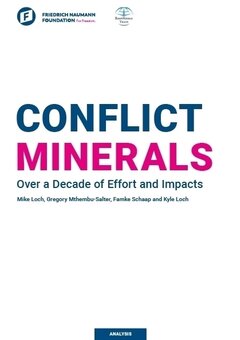Press release
As Strong as the Weakest Link

Nairobi, February 2023 - Since 2010, international organisations together with many states have sought to combat the mining and trade of minerals – especially tin, tungsten and tantalum (3T) – in conflict-affected and high-risk areas (CAHRAs). However, despite all efforts, illegal mining and trade of conflict minerals continues to exist.
A group of experienced industry experts commissioned by the Friedrich-Naumann-Foundation for Freedom (FNF) has conducted a study that takes stock of over a decade of fighting the illicit trade in minerals from Africa. The 66 pages report published in January 2023 analyses the regulations and control mechanisms in place and gives policy recommendations on how to make those controls more effective and efficient.
Tin, tungsten and tantalum are essential for the production of many products. These include construction, auto and artwork (paints), pharmaceuticals (medicines), ICT (computers and mobile telephones) and renewable energy (solar cells and batteries). The market is worth billions of dollars - and demand is booming not least due to the “clean energy” transition.
A large part of the worldwide production of 3T minerals comes from the African Great Lakes countries of the Democratic Republic of Congo, Rwanda, Burundi and Uganda. Besides the legal large scale and artisanal mines, there are a large number of small, unofficial or illegal artisanal mining sites. However, illicit trade occurs at both legal and illegal artisanal mine sites.
The work in the artisanal mines is often highly dangerous, children are exploited as cheap labour, and damage to the environment is considerable. The profits from the illegal business flow past state budgets into private hands, often to finance violent conflicts.
The aim of international efforts over the last twelve years has not been to ban the trade in 3T minerals. Rather, it has been about establishing a certified, legal trade that guarantees the supply of the urgently needed raw materials to the world market, bringing the corresponding revenues to the countries of origin, and ensuring that funds from production and trade do not flow to armed groups.
The main starting point of the various regulations was and is to make the processing companies and end users in the Global North responsible for using only "clean" raw materials that have not financed organised crime or conflict actors. To give effect to this goal, some countries such as Germany have enacted special legislation to regulate the trade and use of minerals. The Supply Chain Act (Lieferkettengesetz), was passed in 2021 and comes into force in January 2023.
The study suggests that the good intentions such as that of the Lieferkettengesetz may fall short due to structural problems upstream. The authors point out that there are weaknesses in the control system at all levels of the supply chain: Upstream (extraction, transport, trade and export), Midstream (smelters and refiners) and Downstream (processors and final producers). However, they identify the most relevant deficits in the countries of origin, where material from illegal mines is often secretly mixed with the production of legal mines somewhere in at the mine sites or along the transport route or at trading houses.
This makes it difficult for companies of the North to meet their legal obligations. To conduct due diligence on their supply chains effectively, companies rely on control mechanisms and institutions along the entire supply chain beginning from the mining sites in Africa. The study shows that the existing mechanisms are not entirely reliable.
The ITRI Tin Supply Chain Initiative (ITSCI) is the largest regulatory scheme of the global metal industry. It was launched in 2009 to control the upstream side of the supply chain. Together with government agencies, the ITSCI system operates at mine sites in the Democratic Republic of Congo (DRC), Rwanda and Burundi, where the minerals are packaged and labelled. All further controls at the downstream stages of the supply chain are linked to this labelling.
However, in October 2022, the industry initiative RMI (Resourceful Minerals Initiative) withdrew its recognition of ITSCI on grounds of breach of integrity and trust. Global Witness, an NGO specialized in the mineral market, even called ITSCI a laundromat for illegally mined minerals in a report published in April 2022. Consequently, as of January 2023, companies in the next processing stage can thus no longer rely on or invoke the certification of minerals by ITSCI, forcing them to reconsider how they fulfil their due diligence obligations.
In total, the study gives 22 recommendations for state and corporate actors to improve the control mechanisms along the supply chain. The most important is that to be effective, regulatory efforts should be more strategically targeted at the “pinch point” of the supply chain. The “pinch point” is the midstream, and consists of all the smelters and refiners,. All 3T have to pass through this point before they can be used in industrial applications. In contrast to the upstream, where there are thousands of small supply points, there are relatively few smelter or refiners. Downstream companies need refineries and smelters to reliably demonstrate that the minerals they use have been sourced responsibly. If refiners can do that, then downstream controls as designed can be effective. If refiners are relying on a system that is not robust, the efforts of the downstream will be much less effective.
To demonstrate their seriousness in the struggle to create responsible mineral supply chains, states, corporates, watchdogs and other international organisations must work with regional partners to seek to close the gaps in the control systems, especially on the upstream side. This requires, inter alia, the necessary resources and independent, robust institutions protected against corruption. Given the weak state structures in the countries of origin, the states of the Global North are called upon to support and monitor the establishment of these institutions. At the same time, companies urgently need to rethink how they conduct supply chain due diligence, surmounting unreliable systems and investing more strategically in targeted research and investigation.
